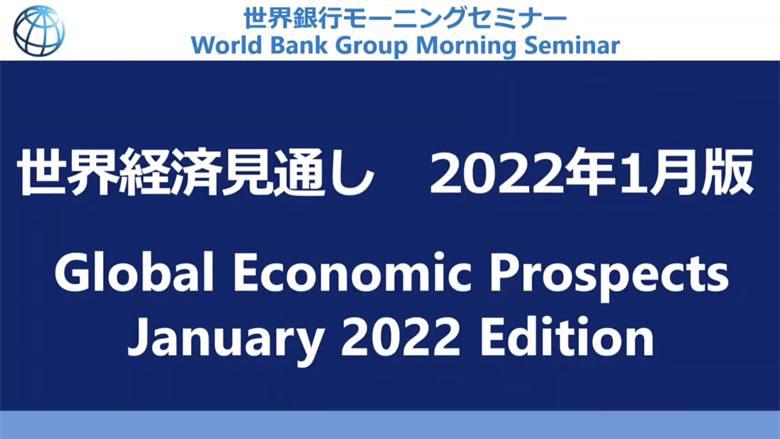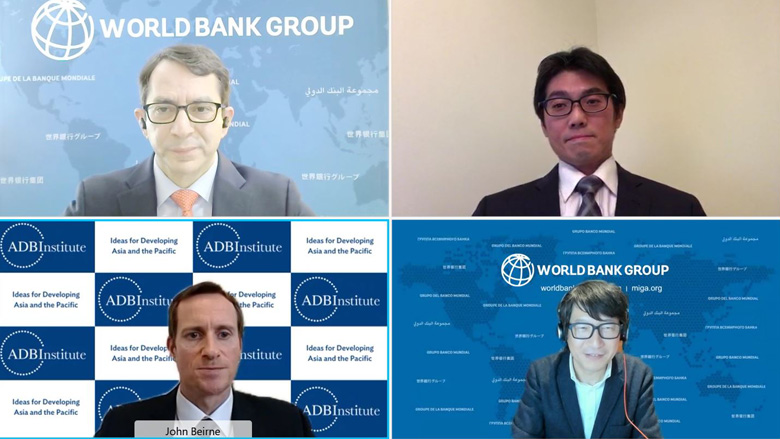Co-organized by World Bank and Asian Development Bank Institute

Co-organized by World Bank and Asian Development Bank Institute
Following a strong rebound in 2021, the global economy is entering a pronounced slowdown amid fresh threats from COVID-19 variants and a rise in inflation, debt, and income inequality that could endanger the recovery in emerging and developing economies, according to the World Bank’s latest Global Economic Prospects report. Global growth is expected to decelerate markedly from 5.5 percent in 2021 to 4.1 percent in 2022 and 3.2 percent in 2023 as pent-up demand dissipates and as fiscal and monetary support is unwound across the world.
The rapid spread of the Omicron variant indicates that the pandemic will likely continue to disrupt economic activity in the near term. In addition, a notable deceleration in major economies—including the United States and China—will weigh on external demand in emerging and developing economies. At a time when governments in many developing economies lack the policy space to support activity if needed, new COVID-19 outbreaks, persistent supply-chain bottlenecks and inflationary pressures, and elevated financial vulnerabilities in large swaths of the world could increase the risk of a hard landing.
At this seminar, Ayhan Kose, Chief Economist and Director of the Prospects Group, Equitable Growth, Finance and Institutions, and Naotaka Sugawara, Senior Economist, Prospects Group, presented the main points of the report. Following the keynote presentation, John Beirne, Research Fellow, Asian Development Bank Institute, shared comments on the report.
9am-10:30am, Wednesday February 2, 2022 (Japan Standard Time)
Keynote presentation
Ayhan Kose
Chief Economist and Director of the Prospects Group, Equitable Growth, Finance and Institutions, World Bank
Presentation material: Global Economic Prospects Presentation (PDF)
Naotaka Sugawara
Senior Economist, Prospects Group, World Bank
Comments
John Beirne
Research Fellow, Asian Development Bank Institute
Presentation material: Comments on World Bank Global Economic Prospects January 2022 Report (PDF)
Q&A
Ayhan Kose is Chief Economist and Director of the Prospects Group in the Equitable Growth, Finance, and Institutions (EFI) Practice Group of the World Bank. He is a member of the EFI leadership team overseeing the Practice Group’s policy, operational, and analytical products on macroeconomics, finance, trade, governance, poverty, and inequality. He also leads the Bank’s work on global macroeconomic outlook, financial flows, and commodity markets. Under his management, the Prospects Group produces the Bank’s corporate flagship report, Global Economic Prospects, in addition to other policy and analytical publications. Mr. Kose previously served as Acting Vice President of EFI and Director of Prospects Group. Prior to joining the World Bank, he was Assistant to the Director of the Research Department and Deputy Chief of the Multilateral Surveillance Division in the International Monetary Fund (IMF). He served in a wide range of roles supporting IMF’s policy, operational, and analytical work. Mr. Kose has written extensively on international macroeconomics and finance. Many of his articles have been published in leading academic journals. His policy and analytical work has also been featured in prominent media outlets. His latest book, Global Waves of Debt (co-authored), analyzes the potential consequences of the rapid debt accumulation in emerging and developing economies. His previous book, A Decade After the Global Recession (co-edited), examines how emerging and developing economies became more vulnerable to economic shocks after the 2009 global recession. Mr. Kose is a Nonresident Senior Fellow at the Brookings Institution, a Research Fellow at the Center for Economic Policy Research (CEPR), a Dean’s Fellow at the University of Virginia’s Darden School of Business, and a Research Associate at the Center for Applied Macroeconomics. He taught at the University of Chicago’s Booth School of Business and INSEAD, and was Assistant Professor at Brandeis International Business School. He has a Ph.D. in economics from the Tippie College of Business at the University of Iowa and a B.S. in industrial engineering from Bilkent University. A native of Turkey, Mr. Kose was born and raised in Istanbul. |

Please check World Bank Group Tokyo Lives Stream YouTube for recordings of the previous seminars.